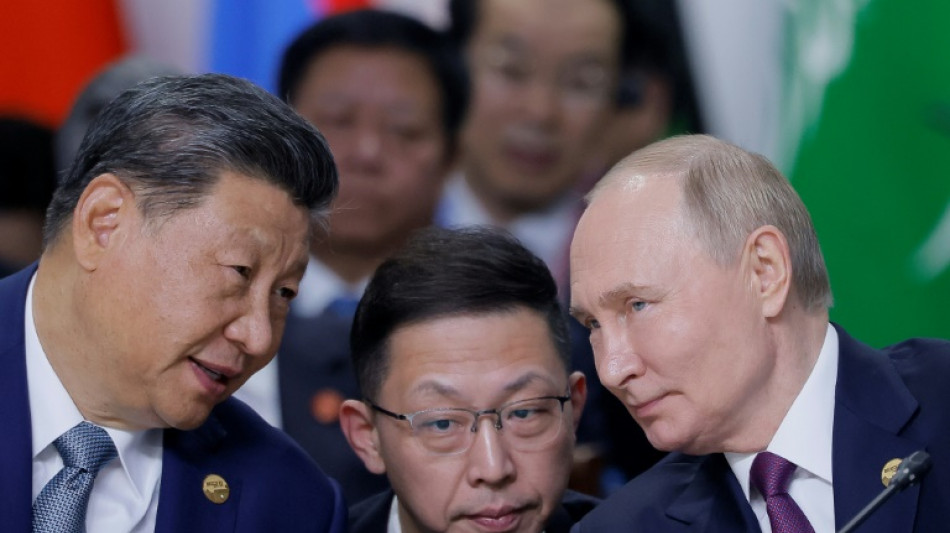
RBGPF
0.0000


Chinese President Xi Jinping headed to Moscow on Wednesday for a key three-day visit including a grand Victory Day parade and a show of support for Vladimir Putin.
Moscow and Beijing declared a "no limits partnership" weeks before Putin ordered Russia's Ukraine offensive in February 2022. The expanded military and trade ties since have troubled the West.
The visit comes with rising China-US tensions over biting US trade tariffs, while President Donald Trump has also made overtures to Putin in a bid to mediate the conflict in Ukraine.
In an article for Russia's Rossiyskaya Gazeta newspaper published Wednesday, Xi hailed "resilient" China-Russia ties and called for other countries to stay out of their relationship.
"The two sides should jointly resist any attempt to interfere with and undermine the China-Russia friendship and mutual trust, not be confused by temporary events or disturbed by the rough seas and use the certainty and resilience of China-Russia strategic cooperation to jointly promote the process of world multipolarisation and the building of a community with a shared future for mankind," he wrote.
The Kremlin had a day earlier praised Russia-China relations as a "genuine example" of cooperation and said they were "at their highest point".
It said Putin and Xi will discuss Ukraine and Russia-US relations at a one-to-one meeting.
China's foreign ministry said the leaders will "rally the Global South, shape global governance in the right direction, unequivocally oppose acts of unilateralism and bullying, and jointly promote an equal and orderly multipolar world", state broadcaster CCTV said.
- Guest of honour -
Putin will address the "grandest" ever annual Victory Day parade in Moscow on Friday for the 80th anniversary of the defeat of Nazi Germany in World War II to rally support for his troops fighting in Ukraine.
Xi is to be the guest of honour at the May 9 parade among 29 other foreign leaders, three of whom come from non-recognised or partially recognised states.
Putin has ordered a three-day ceasefire on the Ukraine frontlines to coincide with the celebrations.
Kyiv has dismissed the gesture as an attempt by Moscow to secure the safety of the parade and called for a month-long ceasefire instead.
Ukraine -- which has fired drones on Moscow in the days running up to the parade -- has said it cannot take responsibility for what happens in Russia.
Some countries had approached Kyiv to ask for safety for their leaders attending the parade, it added.
China has sent 102 soldiers –- the largest foreign military contingent among the 13 participating nations –- for the event.
Ukraine warned Tuesday against any foreign troops participating in the parade, calling it "unacceptable" and helping Moscow "whitewash its war crimes".
World War II, officially remembered in Russia as the "Great Patriotic War", had a devastating impact on the Soviet Union, resulting in more than 20 million civilian and military deaths.
Throughout his rule, Putin has tapped into this national trauma, making May 9 Russia's most important public holiday and championing his army as defenders against fascism.
The Kremlin has also drawn parallels between its offensive against Ukraine and the fight against the Nazis.
- Fine line -
China has portrayed itself as a neutral party in the more than three-year conflict, although Western governments say its close ties to Russia have given Moscow crucial economic and diplomatic support.
Ukraine's President Volodymyr Zelensky in April accused China of supplying arms to Russia and alleged Beijing knew of at least 155 Chinese nationals fighting alongside Russian forces.
Beijing denied that its citizens were being recruited en masse by Russia and urged Chinese nationals not to become involved in conflicts.
It also rejected claims it was supplying weapons to any side in the war.
Over the past decade, China and Russia have deepened their ties however, with Beijing becoming Moscow's largest trading partner following sweeping Western sanctions.
But Russia ranks only as China's fifth-largest trading partner, with Beijing primarily relying on Moscow for its vast supplies of natural gas and oil.
Chinese companies quickly stepped in to fill the void left by the exodus of Western firms -- particularly in the auto sector -- after Russia launched its offensive in Ukraine.
R.Yeung--ThChM